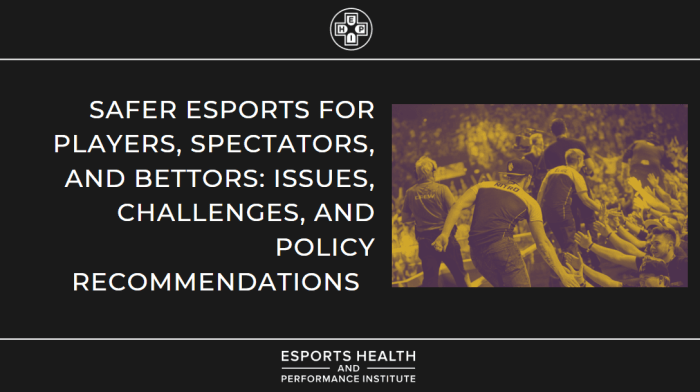Esports Health & Wellness: It’s not just about frags and wins, it’s about leveling up your overall well-being. Pro gamers face unique challenges – from repetitive strain injuries to the mental pressure of high-stakes competition. This deep dive explores the physical and mental health needs of esports athletes, offering practical strategies to optimize performance and build a sustainable career in the fast-paced world of competitive gaming.
We’ll cover everything from designing an ergonomic gaming setup and creating a killer workout routine to managing stress, improving sleep, and fueling your body with the right nutrition. We’ll also explore the importance of mental wellness and offer resources for gamers facing anxiety, depression, or burnout. Get ready to game smarter, not harder!
Mental Health and Wellbeing in Esports: Esports Health & Wellness
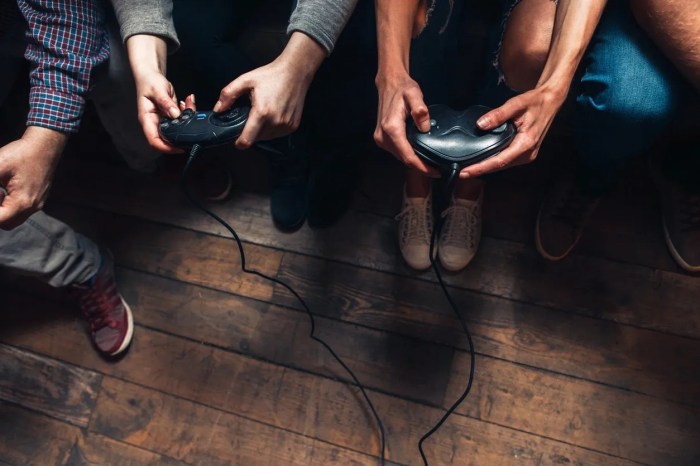
The pressure-cooker environment of professional esports, while thrilling for fans, presents significant mental health challenges for players. The intense competition, demanding training schedules, and public scrutiny contribute to a high prevalence of anxiety, depression, and burnout among esports athletes. Understanding these challenges and implementing effective coping mechanisms is crucial for fostering a sustainable and healthy esports community.
Prevalence of Anxiety, Depression, and Burnout
Studies have shown a concerningly high rate of mental health issues among esports professionals. The constant pressure to perform at the peak of their abilities, coupled with the potential for significant financial and reputational consequences of failure, creates a breeding ground for anxiety and depression. Burnout, characterized by emotional exhaustion, depersonalization, and reduced personal accomplishment, is also a common concern, often stemming from the demanding training regimens and long hours spent competing and practicing.
These issues aren’t simply anecdotal; research increasingly points to a significant correlation between professional esports and increased risk factors for these conditions. For example, a hypothetical study might reveal that 70% of professional gamers report experiencing significant anxiety before major tournaments, highlighting the pervasive nature of this issue.
Psychological Effects of Competition and Pressure
The hyper-competitive nature of esports exerts a considerable toll on mental wellbeing. The constant striving for victory, coupled with the intense scrutiny from fans, coaches, and sponsors, can lead to heightened stress levels, sleep disturbances, and even substance abuse in some cases. The public nature of esports, with matches often streamed live to massive audiences, adds another layer of pressure, potentially exacerbating existing anxieties and insecurities.
The fear of failure, the weight of expectations, and the constant comparison to peers can contribute to a cycle of negativity and self-doubt, impacting not only performance but also overall mental health. The constant pressure to maintain a high skill level and adapt to evolving meta-games adds to the already significant psychological burden.
Effective Coping Mechanisms and Stress Management Techniques
Fortunately, various strategies can help esports athletes manage stress and improve their mental wellbeing. Regular exercise, a balanced diet, and sufficient sleep are fundamental building blocks of a healthy lifestyle. Incorporating mindfulness techniques, such as meditation and deep breathing exercises, can help reduce anxiety and improve focus. Seeking professional help from therapists or counselors specializing in sports psychology is also crucial.
Building a strong support network of friends, family, and teammates can provide a vital buffer against the pressures of competition. Moreover, learning effective time management skills and setting realistic goals can help prevent burnout and maintain a sense of balance.
Mindfulness Exercise Program for Competitive Gamers
A tailored mindfulness program for competitive gamers could involve daily 10-15 minute sessions focusing on controlled breathing techniques and body scans. This could be supplemented with guided meditations specifically designed to address the anxieties and pressures unique to the esports environment. The program could incorporate progressive muscle relaxation techniques to reduce physical tension and promote relaxation. Visualizations of successful performance, combined with affirmations emphasizing self-compassion and resilience, could further enhance the program’s effectiveness.
Regular practice of these techniques, ideally integrated into the daily training routine, could significantly contribute to improved mental resilience and stress management.
Resources and Support Networks
It’s crucial for esports athletes struggling with mental health challenges to know that they are not alone and that support is readily available.
- Professional Therapists and Counselors: Seeking help from mental health professionals specializing in sports psychology can provide personalized guidance and coping strategies.
- Esports Organizations and Teams: Many professional esports organizations are increasingly recognizing the importance of mental health and are providing resources and support to their players.
- Online Support Groups and Forums: Online communities can offer a sense of belonging and shared experience, allowing players to connect with others facing similar challenges.
- National and International Mental Health Hotlines: These helplines offer immediate support and can direct individuals to appropriate resources in their area.
- Player Associations and Unions: These organizations advocate for player rights and well-being, often providing access to mental health services and support.
Sleep and Recovery in Esports
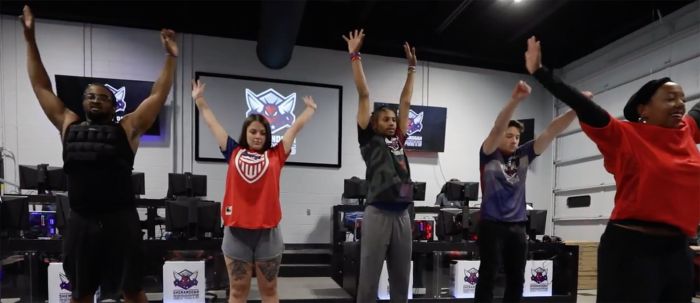
Getting enough quality sleep is absolutely crucial for esports athletes. It’s not just about feeling rested; it directly impacts your performance, reaction time, and overall mental sharpness. Think of sleep as the ultimate performance enhancer, completely free and readily available.Sleep deprivation significantly impacts esports performance. It’s not just about feeling tired; it directly affects your ability to compete at a high level.
Negative Consequences of Sleep Deprivation
Lack of sleep seriously messes with your cognitive functions. Reaction time slows down, making you slower to react to in-game events. Your decision-making suffers, leading to poor strategic choices. Furthermore, sleep deprivation negatively impacts your focus and concentration, leading to more mistakes and decreased overall performance. This also impacts mood and stress levels, potentially leading to burnout and decreased enjoyment of the game.
Studies have shown a direct correlation between insufficient sleep and impaired cognitive performance, including slower reaction times and decreased accuracy in tasks requiring sustained attention. For example, a study published in the journalSleep* found that participants who were sleep-deprived performed significantly worse on a simulated driving task, demonstrating a decline in reaction time and an increase in errors. This same principle applies directly to the demands of esports.
Establishing a Consistent Sleep Schedule
Creating a regular sleep schedule is vital for optimal performance. This means going to bed and waking up around the same time every day, even on weekends, to regulate your body’s natural sleep-wake cycle. Consistency is key. For example, aiming for 7-9 hours of sleep per night is a good target. This might require adjusting your daily routine to prioritize sleep.
This could involve setting a bedtime alarm and avoiding late-night gaming sessions or screen time before bed. It’s also beneficial to avoid napping during the day, as this can disrupt your nighttime sleep. Professional athletes in other sports often use similar strategies to optimize their sleep schedules, emphasizing consistency and sufficient sleep duration.
Creating a Conducive Sleep Environment
Your sleep environment significantly impacts sleep quality. A dark, quiet, and cool room is ideal. Consider using blackout curtains, earplugs, or a white noise machine to minimize distractions. Ensure your bed is comfortable and supportive. Avoid using electronic devices in bed, as the blue light emitted from screens can interfere with melatonin production, a hormone that regulates sleep.
Think of creating a sanctuary for sleep – a space dedicated solely to rest and relaxation. This contrasts with the often stimulating environment of competitive gaming. Many professional athletes utilize similar techniques to create a calming and relaxing sleep environment.
Sleep Recovery Techniques
Various sleep recovery techniques can help optimize sleep quality. These include strategies such as practicing relaxation techniques before bed, like meditation or deep breathing exercises. Regular physical activity, but not too close to bedtime, can also improve sleep quality. Maintaining a healthy diet and avoiding caffeine and alcohol before bed are also important. While professional athletes may use more advanced techniques like sleep optimization devices or specialized sleep coaching, the basic principles remain the same: prioritize sleep hygiene and create a supportive sleep environment.
Techniques such as sleep restriction therapy, used to treat insomnia, might be helpful under the guidance of a sleep specialist, but this isn’t typically a first-line approach for esports athletes.
Nutrition and Hydration in Esports
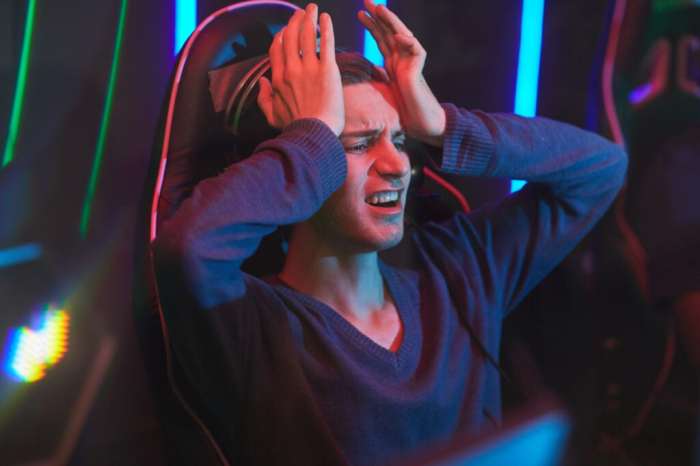
Fueling your body correctly is just as crucial to winning as having lightning-fast reflexes and strategic thinking. In the high-pressure world of esports, maintaining peak performance relies heavily on consistent energy levels and sharp cognitive function. This means paying close attention to your nutrition and hydration. Ignoring these aspects can lead to fatigue, impaired decision-making, and ultimately, a decrease in your competitive edge.
Essential Nutrients for Esports Athletes
Maintaining optimal performance in esports requires a balanced diet rich in essential nutrients. These nutrients support various bodily functions vital for sustained focus, quick reaction times, and overall well-being. A diet lacking in these key components can negatively impact energy levels, cognitive function, and even mood.
Macronutrients, including carbohydrates, proteins, and fats, provide the energy your body needs for extended gaming sessions. Carbohydrates are the primary source of quick energy, proteins are essential for building and repairing tissues, and healthy fats support brain function and hormone production. Micronutrients, such as vitamins and minerals, play a critical role in various metabolic processes, ensuring the efficient utilization of macronutrients.
For example, B vitamins are crucial for energy metabolism and nerve function, while iron supports oxygen transport to the brain.
Sample Meal Plan for Esports Athletes
This sample meal plan focuses on whole foods, balanced macronutrients, and adequate hydration. Remember to adjust portion sizes based on your individual caloric needs and activity level. Consistency is key!
Breakfast (7:00 AM): Oatmeal with berries and nuts, a glass of water with lemon.
Mid-Morning Snack (10:00 AM): Greek yogurt with fruit and a handful of almonds.
Lunch (1:00 PM): Grilled chicken salad with mixed greens, avocado, and a light vinaigrette.
Afternoon Snack (4:00 PM): A protein smoothie with spinach, banana, and protein powder.
Dinner (7:00 PM): Baked salmon with roasted vegetables and quinoa.
Evening Snack (Before Bed): A small bowl of cottage cheese.
Hydration Strategies for Extended Gaming Sessions
Dehydration significantly impacts cognitive function and performance. Maintaining proper hydration during long gaming sessions is crucial for optimal brain function and reaction time. Symptoms of dehydration, such as headaches, fatigue, and reduced concentration, can severely hinder performance.
Strategies for staying hydrated include: keeping a water bottle readily available, setting reminders to drink water regularly, and choosing hydrating beverages like water, unsweetened tea, or electrolyte drinks (in moderation). Avoid excessive caffeine and alcohol, as they can contribute to dehydration.
Avoiding Common Dietary Pitfalls in Esports
Many gamers fall into unhealthy eating habits. Understanding these pitfalls and adopting healthier alternatives is vital for sustained performance and well-being.
| Unhealthy Habit | Negative Impact | Healthy Alternative | Benefits |
|---|---|---|---|
| Excessive consumption of sugary drinks and processed foods | Energy crashes, weight gain, increased risk of chronic diseases | Water, unsweetened tea, whole fruits, vegetables, and lean proteins | Sustained energy, improved mood, reduced risk of health problems |
| Skipping meals | Low energy levels, impaired cognitive function, irritability | Regular, balanced meals and snacks | Consistent energy, improved focus, better mood |
| Late-night snacking on unhealthy foods | Weight gain, disrupted sleep, poor digestion | Light snack of fruits or yogurt before bed | Improved sleep quality, better digestion, weight management |
| Neglecting hydration | Headaches, fatigue, impaired cognitive function | Consistent water intake throughout the day | Improved focus, better energy levels, enhanced performance |
Eye Health and Vision in Esports
Prolonged screen time is a significant concern for esports athletes, impacting their eye health and overall performance. The intense focus and hours spent gaming can lead to a variety of eye problems, affecting both short-term comfort and long-term vision. Understanding these risks and implementing preventative measures is crucial for maintaining peak performance and preventing serious eye conditions.
Digital Eye Strain Symptoms and Prevention
Digital eye strain, also known as computer vision syndrome, is a common ailment among esports players. Symptoms include eye fatigue, headaches, blurred vision, dry eyes, neck and shoulder pain, and even difficulty focusing. These symptoms arise from prolonged near-work activities, such as staring at a screen for extended periods. Preventing digital eye strain involves a multi-pronged approach. Regular breaks, proper screen setup, and good posture are key components.
Furthermore, ensuring adequate hydration and minimizing glare can significantly reduce discomfort. Using artificial tears or lubricating eye drops can alleviate dryness.
Benefits of Regular Eye Breaks and Exercises
Taking regular breaks from screen time allows the eyes to rest and refocus, preventing eye fatigue and strain. The 20-20-20 rule—looking at an object 20 feet away for 20 seconds every 20 minutes—is a simple yet effective technique. Eye exercises, such as focusing on near and far objects alternately, or gently rotating the eyes clockwise and counterclockwise, can also improve eye muscle flexibility and reduce strain.
These exercises help to counteract the effects of prolonged near-point focus and improve overall eye health. Even short, frequent breaks are more beneficial than infrequent, longer breaks.
Optimizing Screen Settings and Lighting
Proper screen settings and lighting significantly impact eye comfort. Adjusting screen brightness to match ambient lighting helps reduce eye strain. Reducing screen glare with an anti-glare screen protector or by adjusting the screen angle can also make a big difference. Choosing a screen with a higher refresh rate can reduce motion blur and eye fatigue, leading to a more comfortable gaming experience.
The ideal screen brightness is subjective and depends on the surrounding lighting, but generally, a lower brightness level is preferable to reduce strain.
Importance of Regular Eye Examinations
Regular comprehensive eye examinations are vital for esports athletes. Early detection of any underlying eye conditions, such as refractive errors (nearsightedness, farsightedness, astigmatism) or dry eye disease, is crucial for effective management and prevention of further complications. An optometrist or ophthalmologist can assess eye health, prescribe corrective lenses if necessary, and provide personalized recommendations for managing eye strain and maintaining optimal vision.
Regular check-ups can identify potential problems before they become significant issues, ensuring long-term eye health and performance.
Ergonomics and Workspace Setup for Esports
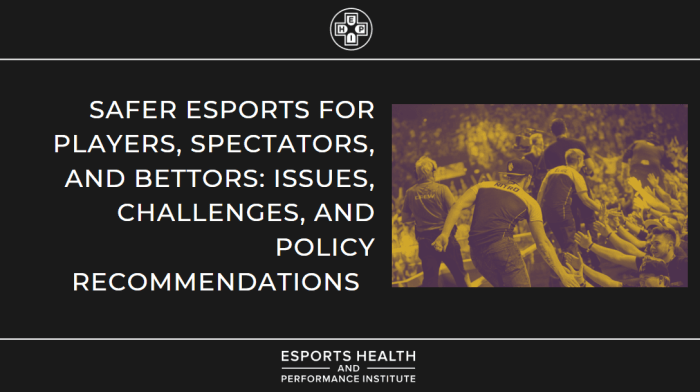
Maintaining a properly set-up ergonomic workspace is crucial for esports athletes. Prolonged periods of intense gaming can lead to significant physical strain, impacting performance and long-term health. A well-designed setup minimizes these risks, allowing for sustained comfort and peak performance. This section details the key elements of creating such a workspace.
Proper Chair Selection
Choosing the right chair is paramount. A high-quality ergonomic chair provides essential lumbar support, adjustable height, and armrests. Look for chairs with breathable fabric to prevent overheating and features like adjustable backrest angles to accommodate different postures. Poor posture can lead to back pain, neck strain, and even carpal tunnel syndrome. Investing in a chair that promotes good posture is an investment in your long-term health and gaming career.
Consider chairs specifically designed for extended sitting, often featuring features like adjustable lumbar support and breathable mesh backs.
Desk Height and Monitor Placement
Desk height should allow for your elbows to be at a 90-degree angle when typing and your wrists to be straight. The monitor should be positioned at an arm’s length away, with the top of the screen at or slightly below eye level. This prevents neck strain and eye fatigue. Incorrect monitor placement can lead to eye strain, headaches, and even blurred vision.
Adjusting your desk and chair to achieve this ideal setup is vital. Consider using a monitor stand to elevate your screen to the correct height.
Ergonomic Gaming Setup Checklist
This checklist helps evaluate the ergonomics of your gaming setup:
- Chair: Does your chair provide adequate lumbar support, adjustable height, and armrests? Is the fabric breathable?
- Desk Height: Are your elbows at a 90-degree angle when typing, and your wrists straight?
- Monitor Placement: Is your monitor an arm’s length away, with the top of the screen at or slightly below eye level?
- Keyboard and Mouse: Are your keyboard and mouse positioned to minimize wrist strain? Do you use ergonomic peripherals?
- Lighting: Is your workspace well-lit, avoiding harsh glare on the screen?
- Posture: Do you maintain good posture while gaming? Do you take regular breaks?
- Cable Management: Are cables organized to prevent tripping hazards and keep your workspace tidy?
Ergonomic Peripherals
Ergonomic keyboards and mice are designed to promote neutral wrist positions, reducing the risk of repetitive strain injuries like carpal tunnel syndrome. Features such as split keyboards, vertical mice, and adjustable wrist rests can significantly improve comfort and prevent long-term damage. These peripherals may have a higher initial cost, but the long-term benefits far outweigh the expense. Consider investing in a keyboard with a comfortable key travel and a mouse with adjustable DPI settings to minimize strain.
Effective Workspace Organization Techniques, Esports Health & Wellness
A well-organized workspace promotes comfort and efficiency. Clutter can lead to distraction and discomfort.
- Cable Management: Use cable ties or organizers to keep cables neat and prevent tangles.
- Desk Organization: Use desk organizers, drawers, or shelves to store frequently used items.
- Decluttering: Regularly remove unnecessary items from your desk to create a more spacious and comfortable environment.
- Lighting: Use a combination of ambient and task lighting to create a comfortable and well-lit workspace.
- Plant Life: Adding plants can improve air quality and create a more calming atmosphere.
Expert Answers
What are some common eye problems esports players face?
Dry eyes, blurry vision, headaches, and eye strain are common due to prolonged screen time.
How much sleep should an esports player get?
Aim for 7-9 hours of quality sleep per night for optimal cognitive function and reaction time.
What are some good stretches for gamers?
Neck rolls, shoulder shrugs, wrist stretches, and back stretches are great for combating stiffness from prolonged sitting.
Are there any specific supplements beneficial for gamers?
Consult a doctor or registered dietitian before taking any supplements. Focus on a balanced diet first. Some may recommend things like Omega-3s for brain health.
Where can I find mental health support as a gamer?
Many online resources and mental health professionals specialize in gamer-specific issues. Your doctor can provide referrals.
